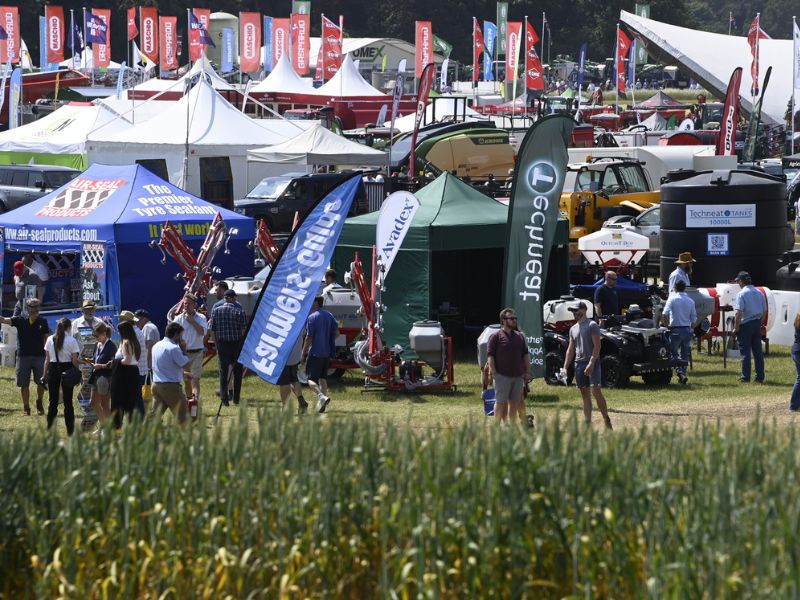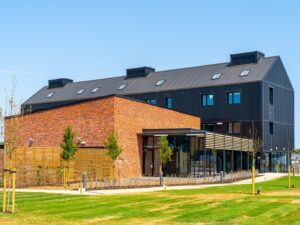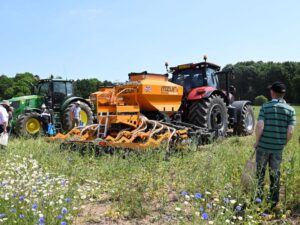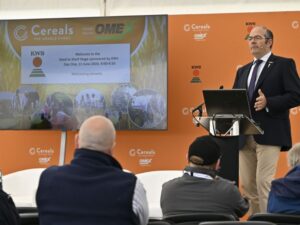This year’s Cereals seminar programme, themed ‘Your connections to a better business’, brought together 100s of farmers and experts to share the latest research, advice and experience to boost profitability and sustainability.
Kicking off the programme was a session on privately funded environmental incentives, exploring the different ways in which farmers can generate an income from their natural capital. “There are multiple ways to engage with markets – directly with buyers, through aggregators, or farm clusters,” said Professor Fergus Lyon, who is Managing Partner at Easthall Farm, Hitchin, Hertfordshire.
He suggested taking advantage of the full mix of markets, from short-term options like cover cropping to improve water quality and premium prices for nature-friendly crops, to long-term contracts for biodiversity net gain or tree planting. “Uncertainty is holding us back in some areas (like carbon trading) but the science is getting stronger and contracts are clearer, so once we’ve shown we can be net zero ourselves we’ll have more confidence in selling carbon.”
Collaborating is a great way to access private finance and deliver landscape scale benefits, as Roger Dalrymple, director at Waitatapia Farming in New Zealand, explained. “We need to understand what effect our farm is having on the environment and produce the data to prove what we’re doing to improve, so that other people can tell our story rather than trying to tell it ourselves,” he said.
Mr Dalrymple works with 350 other farmers on the Rangiteki Rivers Catchment Collective, across 700,000ha, undertaking monthly river water testing to drive management decisions. The group secured NZ$2.5m (£1.2m) to improve water quality. “We’re working together to get ahead of where society wants us to be – being farmer-driven is key.”
Alison Rickett agreed that working together delivers more benefits all round compared to individual approaches. She has matched groups of farmers with large investors to deliver environmental benefits through Landscape Enterprise Networks (LENS). The East of England cluster is expected to generate £4m in 2023 across more than 100,000ha, and the Cumbria network delivered six times the benefits that could have been achieved individually. “Collaboration is the only way forward to deliver LENS.”
Farmers also came together to learn from each other at the popular new AgAnalyst Academy focusing on making precision farming pay, the NAAC Drainage Hub, and the new Cereals Stories stage, which featured farming celebrities like Olly Harrison and the Wurzels, fundraising for the Multiple System Atrophy Trust (MSAT). In total, the exhibition was 30% larger and registered attendance was up 7% on 2022, raising £30,000 for the MSAT, plus the charity raffle.
Other sessions explored topics like net zero and climate change, soil health, regenerative farming and publicly funded environment incentives. The final session of the two-day event brought together seven innovators for quick fire presentations on the latest thinking and technology. This featured the next generation of autonomous drones, robots, and methane tractors, as well as new research into pollinator monitoring, gene editing and sugar signalling to boost wheat yields.
“Science will be a massive player in how we get to net zero,” said Robert Smith from Russell Smith Farms, Hertfordshire, when explaining the measures he has taken to ensure business sustainability in a changing climate. “It’s more important than ever that we produce more of our own food for a secure future.”
- The two-day event was held at a new site this year – Thoresby Estate in Nottinghamshire – on 13-14 June. For more information visit www.cerealsevent.co.uk.






